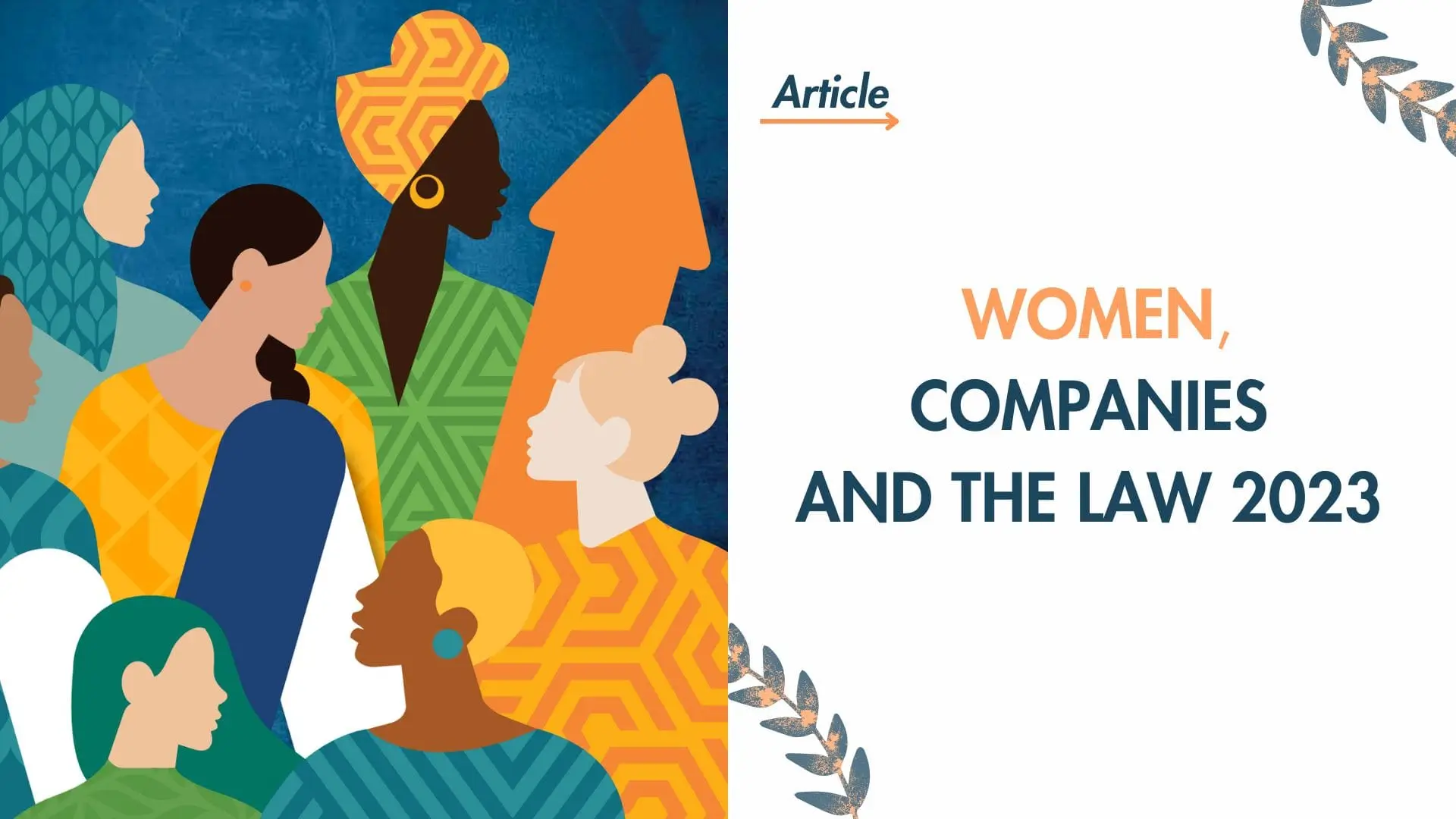
WOMEN, COMPANIES AND THE LAW 2023
The state of women’s legal rights
Policies that empower women strengthen the economy and are crucial to sustainable development progress. In recent years, slowing global growth, increasing climate change risks, conflict and the lingering effects of COVID-19 have dealt a major setback to this progress – exerting disproportionate effects on women’s living conditions and livelihoods (Akrofi, Mahama and Nevo 2021; De Paz, Gaddis and Muller 2021; ILO 2022; Torres et al. 2021).
The analysis of 53 years of legislation affecting women’s economic rights presented in Women, Business and the Law shows why greater gender equality is essential to end extreme poverty and stimulate shared prosperity. Equal treatment of women under the law correlates with an increase in the number of women entering the workforce, remaining there and rising to management positions. This generates higher salaries for women, and makes it easier for more of them to start their own businesses1. Reforms that encourage women to enter the workforce – whether as employees or entrepreneurs – can both level the playing field between men and women and make the economy more resilient to shocks (Halim, O’Sullivan and Sahay 2022; Ubfal 2022). The Women, Business and the Law project has tracked these regulatory changes from 1970 to the present day, presenting objective benchmarks to measure global progress towards gender equality in 190 economies.
Women, Business and the Law 2023 details the current state of women’s legal rights. The ninth in the series, this study presents a data set and index structured around a woman’s working life (figure ES.1), as well as findings from historical data that highlight opportunities for reform that can inspire efforts towards parity. Governments, the private sector and civil society can use this framework to identify and remove obstacles to women’s economic empowerment, thereby stimulating their participation in the workforce and entrepreneurship. The World Bank Group’s lending and technical assistance operations use data from the Women, Business and the Law report to provide the analytical underpinning for project design. Other institutions – such as the Atlantic Council, Equal Measures 2030, the Georgetown Institute for Women, Peace and Security, The Heritage Foundation, the Millennium Challenge Corporation and UN Women – use it to influence policy changes.
Women still enjoy only three-quarters of the legal rights of men, and nearly 2.4 billion women of working age still do not have the same legal rights as men. The global average score of the Women, Business and Law Index is 77.1 out of 100 in 2022, only half a point higher than in 2021. Today, 14 economies (Belgium, Canada, Denmark, France, Germany, Greece, Iceland, Ireland, Latvia, Luxembourg, Netherlands, Portugal, Spain and Sweden) score 100 on the index, meaning that women are on an equal footing with men in all areas measured (table ES.1). Nearly 90 million women of working age have achieved legal equality over the past decade. Yet 2.4 billion women of working age do not have the same legal rights as men. More than half of them live in East Asia and the Pacific (710 million) and South Asia (610 million), followed by Sub-Saharan Africa (330 million), the high-income countries of the Organisation for Economic Co-operation and Development (OECD) (260 million), Latin America and the Caribbean (210 million), the Middle East and North Africa (150 million), and Europe and Central Asia (140 million). Economies with average index scores above the world average of 77.1 are generally high-income OECD countries, as well as countries in Europe and Central Asia, Latin America and the Caribbean (figure ES.2). The Middle East and North Africa and South Asia have the lowest average scores.
Progress in equal treatment for women was the lowest in 20 years. Since 2021, 18 economies have introduced a total of 34 gender equality reforms in all areas measured by the Women, Business and Law Index (figure ES.3), the lowest number since 2001. Sub-Saharan Africa accounts for more than half of all reforms, with seven economies – Benin, Republic of Congo, Côte d’Ivoire, Gabon, Malawi, Senegal and Uganda – adopting 18 positive legal changes. Among these countries, two stand out: Côte d’Ivoire and Gabon. Côte d’Ivoire has adopted reforms that prohibit gender-based discrimination in access to credit, combat domestic violence and lift restrictions on women’s employment. Gabon continued on the path of reform begun last year, harmonizing passport procedures for both sexes, imposing equal pay for work of equal value, and removing all restrictions on women’s employment. As a result, for the first time in 53 years, two economies in the Sub-Saharan African region score above 90 in the Women, Business and Law Index, and the average score for this region exceeds that of the East Asia and Pacific region. Other countries introducing reforms this year include Bahrain, China, Costa Rica, Indonesia, Iraq, Jamaica, Kazakhstan, Malta, Mongolia, Pakistan and the Netherlands.
Most of the reforms concerned increased paid leave for parents and fathers, the removal of restrictions on women’s work and the obligation to guarantee equal pay. Although the Parenthood and Remuneration indicators offer the greatest scope for improvement, with average scores of 56.4 and 70.0 respectively, they also recorded the highest number of reforms in 2022. Seven economies in five regions have reformed the laws measured by the Parenthood indicator. Specifically, China, Malta and the Netherlands have made paid parental leave mandatory; Costa Rica, Malawi and Mongolia have introduced paid paternity leave; and Senegal has amended its legislation to prohibit the dismissal of pregnant women. In addition, six economies in four regions have adopted reforms reflected in the Compensation indicator. Costa Rica, Côte d’Ivoire, Gabon, Kazakhstan and Senegal have lifted restrictions on women’s employment. Gabon and Mongolia have also introduced provisions requiring equal pay for work of equal value.
Source: “EXECUTIVE SUMMARY WOMEN, BUSINESS AND THE LAW 2023”; World Bank Group